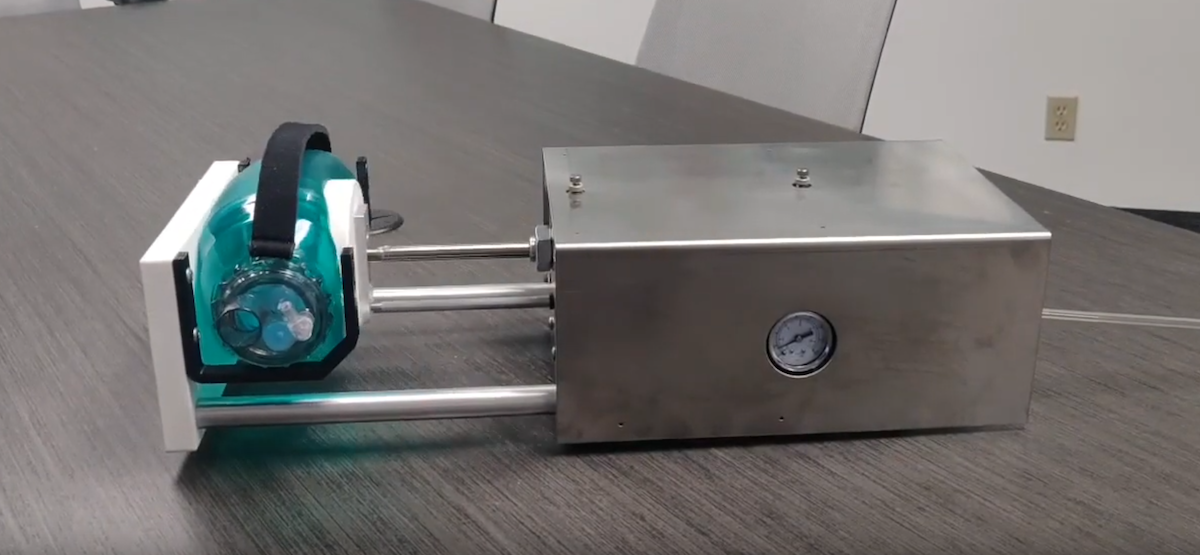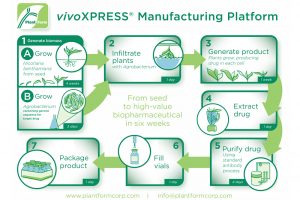02:42 – What normally keeps Danby busy
03:44 – Collaborating with others towards a common cause
05:59 – Current production status and government contract
06:55 – A shoutout by Prime Minister Trudeau
08:24 – Previous responses by Danby to global needs and Jim’s “WHY”
09:49 – The hope that the ventilators will never be needed
11:03 – Working from home and the pleasant discoveries of
Click the “Connect” tab to browse the web link …
Website: Ventilators for Canadians
Jason Bavington (00:01):
Hi everyone. My name is Jason from DUX — Your Local City Guide and welcome to our second blog. The first one is up and we have the second one coming to you today and I’m very, very excited to be sharing this blog with you because we have a special guest today. I know all our guests our special, but you know, I really scored a real good gem this time. Jim Estill who’s the CEO of Danby and the reason why we’re filming a lot of these blogs is because there’s a lot of businesses and organizations that are doing a lot of incredible things during the Covid-19 crisis. As of the time of this filming we’re still, you know, we’re still head deep in this crisis. We haven’t seen the other side. We definitely haven’t come through the last half of the other side yet.
Jason Bavington (00:44):
So here we are sharing a lot of the stories that businesses and organizations are doing to give back and to contribute and have a positive contribution to the Covid-19 situation. And to that end, I’d like to welcome on Jim Estill, he’s the CEO of Danby, to our blog today. Thanks for joining us Jim. Well, thanks for having me, Jason. Yeah. Last time we got a chance to hang out, you know, it was beginning of March. We went for our walking meeting, which I think is a fantastic idea. And then March break hit and the world seemingly turned on its ear and here we are today amidst this Covid-19 situation, which I don’t think any of us could have predicted.
Jim Estill (01:27):
No, absolutely not. You should have told me in March this was going to happen. I would have prepared differently.
Jason Bavington (01:32):
Yeah, I know! I would have like gone shopping earlier, you know avoid standing in line. Exactly. But buy toilet paper. Buy toilet paper, you know, we did joke how that at least the air is going to get cleaner and now the air is like really clean.
Jim Estill (01:44):
Oh, I don’t think that the world could have done anything better for the environment than this. Like, if you look at silver linings, that’s one of the silver linings.
Jason Bavington (01:54):
Yeah. And I think that’s going to be one of the things that comes out of the outcome of this situation and this time is society is that I think people will have discovered this whole “clean air” idea and be like, you know, I kinda like that.
Jim Estill (02:07):
You know, what’s it like to continue this, this new legacy. I think so completely. And you see we’re in Canada, we’re in Guelph, so we actually have pretty good air quality anyways. We do. But there are other countries, India and places like that, that the smog is really, really bad. That’s where you see a really, really noticeable difference. But I’m an eco environmental guy and so I love what this is doing for the planet. It’s good for that.
Jason Bavington (02:33):
Silver lining, indeed. So Jim, tell me a little bit about Danby and what Danby normally does when there’s not a pandemic in our midst?
Jim Estill (02:42):
Well, so Danby appliances makes and sells bar fridges and freezers and wine coolers and appliances. And so normally we’re selling appliances to appliance stores and to Costco and Home Depot and Lowe’s and Amazon and whatnot. Normally that’s our business. Then what happened is Covid happened. So we started working from home. We closed a couple of the factories. Our sales dried up a lot except for freezers, which of course are through the roof. But nobody needs a wine cooler, you know, a wine cooler, is sort of an optional purchase and whatnot. So, bottom line is business was bad. And then I saw the need for ventilators, which basically people would show up in Italy at the hospital and they’d say, “Oh, you’re 70 years old, great, go die in the hall. We don’t have a space for a ventilator.” So I saw the need and I’m an inpatient entrepreneur guy.
Jim Estill (03:44):
And I said, well, what can we do? And we decided to make ventilators. And so at the time it looked like ventilators were a high need. Now it looks like they’re not as big a need, but … and people said, “Oh, you pivoted into ventilators.” I don’t even think it’s a pivot, cause a pivot to me would be, “Oh, we’re going to be a ventilator manufacturer going forward.” We’re not going to be. Now when we put our engineers and designers onto design events later, I found out within like a week, we can’t do this. We lack the capability. So we partnered with ABS Friction and Crystal Fountain and JMP solutions. And then ultimately we found an open source design from Medtronic and we needed a medical partner. So we partnered with Bayless Medical. So we’re actually supplying the labor to do the assembly of these for Bayless. That’s what we’re doing is we’re assembling ventilators. We’re still selling
Jason Bavington (04:43):
freezers and fridges. So come and buy your freezers and fridges. I might need a place to store my frozen veggies. So you know, we might be in touch. Exactly. Yeah, so that’s really interesting. So you started this initiative called Ventilators for Canadians. You partnered with these other companies, ABS Friction, Crystal Fountains, JMP Solutions. And so you guys all have a piece of the project where collectively at the end of the day you’re able to provide ventilators and ventilator type equipment to those who need. That’s the way the initiative panned out?
Jim Estill (05:17):
Exactly what we did. Each of us have unique skills and resources and so we all contribute our own skills and resources. So we’re mostly doing ventilators. We’re also doing a respirator. Respirators are different. It’s like a suit that you wear that goes over your face that you breathe through a filter and you breathe out through a filter. So you could go into a toxic environment or for example, your example of the company that can’t have their people working, work side by side using a personal respirator. So we’re just starting to produce those as well.
Jason Bavington (05:52):
So how far have you gotten in the process? Are the ventilators complete? Have they been distributed?
Jim Estill (05:59):
The ventilators are not yet assembled. We’re just in the process. We’re setting up the factory where we have the contract, though. So we’re providing, the government has given us a very large contract to produce ventilators. So we’re producing to that contract. The positive air pressure respirators, we have, it’s just in for Health Canada approval right now. And so we’re just starting to produce those as well.
Jason Bavington (06:24):
And I find it, I find it amazing. You know, often we’re very critical of how slow government moves. And you know, there’s lots of creative commentary about government, but at least here in Canada, it’s been very impressive how the government has been very, very responsive to the needs of Canadians and recognizes what Canadians and companies and organizations such as yours have contributed. I know there’s a video where Prime Minister Trudeau gave a mention to Ventilators for Canadians and we’re actually going to play that for you right now.
Prime Minister Trudeau (06:55):
We’ve already signed letters of intent with a number of partners to produce the things we need. And today we have more good news to share. We’re working with Thornhill Medical, CAE, Ventilators for Canadians, and a group led by Starfish Medical to produce up to 30,000 made in Canada ventilators.
Jason Bavington (07:16):
That’s fantastic. So Prime Minister Trudeau gave, you a mention! Maybe when this is all over he’ll invite all you guys out for tea. That’d be great!
Jim Estill (07:24):
Exactly. That’s what we hope. Exactly. And we’ll hope that we are going out for tea after this is all gone. And there will be a post pandemic business, a post pandemic world. So, that’s the message for your listeners is — there’s life in pandemic and there’s post pandemic. We can still be pretty grateful that our lives are still pretty good.
Jason Bavington (07:46):
Just that we can’t go out. It’s not a big deal, right? Yeah, everyone struggles in a different way. And of course struggle is always relative. Right? Exactly.
Jim Estill (07:55):
Exactly. And someone said, in the previous generations people would be called to go to war and that’s what they’re calling was. And now we get called to sit on our couch.
Jason Bavington (08:06):
So we have it really tough. Yeah, we are called to stay home and order in Uber Eats and watch a lot of Netflix. Exactly. At the same time, you know, there’s a lot of struggles and people who have lost their jobs and lots of relationship difficulties and there are a lot of definitely a lot of struggles out there. But the Covid situation, how you and your organization have responded. This is not the first time that you kind of identified and headed the call. You know, as many of our viewers know, you’re well known for your work that you did for Syrian refugees. Helping bring families in. First I believe was 50 group of 50 families and another group of 50 families. And again the government, you know, you have the Order of Canada as recognition for all that amazing work and it’s amazing that people do this kind of work and contribute to society in a way that is far different than the average person out there and the average contribution. I’m just curious, what’s your WHY behind helping out Syrian refugees, creating Ventilators for Canadians. What’s the why that drives Jim?
Jim Estill (09:15):
Oh, I mean, it probably sounds arrogant, but I want to save the world. But you have to do it in the context of what are the pieces that I actually can do. So in the Syrian thing, great. Helping bring in a few refugees and saving a few that sounds good, but what would really be the solution? Let’s solve the war. I wasn’t able to solve the war. Ventilators — we’re doing ventilators for Canadians. We’re not doing ventilators for the United States or for Italy and Spain. They both needed them badly. But even New York city needed ventilators. And now fortunately I’m not sure that Canada is going to need them. So to some extent I’m hoping that our ventilators never actually need to get used because even if you need a ventilator, you don’t want to go on a ventilator.
Jason Bavington (10:03):
No, you don’t. And that’s also kind of interesting that all these resources and all these logistics is being put into place for the ventilator program, which, we all hope never needs to be used, which is just crazy, you know? So all that time, all that energy, all that money goes into something that we hope is never needed. But the fact is that if it was needed that there was that supply chain in place that you positively contributed to, to fill that need if it were to occur, which is incredible.
Jim Estill (10:37):
Exactly. It’s what I try to do.
Jason Bavington (10:39):
So what have you learned from the whole Ventilators for Canadians process? You’ve done a lot of great things on the logistics side. Is there anything that you would do differently in the future? Hindsight is 20/20, as we know.
Jim Estill (10:50):
Oh, I mean, right. You’re right. Everything’s .. hindsight’s 20/20. I’m not sure – in hindsight – I’m not sure we need the ventilators. But, at the time I thought we thought that was the need. Right? So that’s what we … one thing I’ve learned from Covid and work at home. Before work at home, I’m an old school guy and I always said, “no, you need to be in the office.” And I liked having people in the office because I could walk around and talk to people and I kind of was old school. I think after this we’re going to be, two thirds of the people who work in the office will work at home. Of course you can’t work at home when you’re working in a factory or driving a forklift. But we’ll still have a somewhat of a work at home culture because what I learned is that two thirds of the people can work better at home than they do in in the office. So why not just keep working at home? So that’s the positive.
Jason Bavington (11:45):
I remember reading like 15 years ago when, you know, this idea of work at home was kind of becoming more popular or you know, pacing people for basically a four day work week. But they would still work the equivalent of 40 hours because just like you know, when the long weekend comes up, everyone works that much harder because they’re excited by it, right? And there’s been a big stigma about working from home. I work from home, I’ve been doing it for over a decade now and the stigma is well you know people, they’re going to be lazy, they’re actually not going to get their work done. And as we’ve seen through Covid and, just like you said, the work does get done. It works for the majority of people and why not continue that. It might make people happier, less resource / administrative office requirements and it can potentially be a nice win-win, environmental win, a lot less commuting, remote meetings, just like this one. So, I think the world has learned a lot of positive possibilities for how we all work and interact with each other going forward.
Jim Estill (12:45):
Exactly, exactly. As a matter of fact, some people, like you say, “Oh, people aren’t going to work when they’re working at home.” Some people I have, you almost have to go the other way and say, listen, it’s 10 o’clock at night. You don’t, you shouldn’t be working.
Jason Bavington (12:57):
Yeah, Senior Manager. I appreciate that email you sent to me but, you know, it was 1:20 in the morning. You might want to get some sleep. Very interesting. So Ventilators for Canada, one of the greatest ideas that hopefully we will never need. Exactly. Fantastic. All right, so thank you very much Jim. Again, this is Jason from DUX — Your Local City Guide. If you’re watching this video anywhere else but on our website, head on over to dux.city. That’s d u x . city. Click on “Blog”. You’ll find the blog post there for Danby. And in the blog post we’ll post a link to Ventilators for Canadians. You can check out their website. They have a video on there you can check out what they’re doing, find out more. Jim, if there’s a way that a company wants to contribute or help you guys out in way they can get in touch through the website, I imagine?
Jim Estill (13:54):
Absolutely. I have this test. If you can’t get ahold of me with Google, then you’re “not good enough” to get ahold of me cause it’s Jim Estill, Danby Appliances. I’m pretty public about my email address and stuff.
Jason Bavington (14:06):
Yeah, that’s a great litmus test. Find us on Google…Maybe. Exactly. Alright, well thanks very much Jim. Again, Jason, with DUX — Your Local City Guide. And everyone out there, keep sharing and supporting the local goodness. We will get through this. We will get to the next normal and we’ll talk to you then. Cheers.
Jim Estill (14:29):
Thanks Jason.






